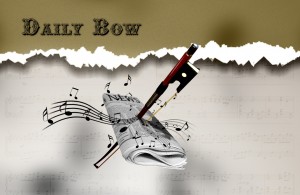 Classical Music in a War-Torn Land
Classical Music in a War-Torn Land
Finally, classical music has made a comeback in Palestine. In the face of the armed Israeli occupation, a revival of classical music has emerged in recent years in the West Bank, helping to revitalize – even if only a little bit – the war-torn land. The establishment of schools like the Edward Said National Conservatory of Music and the Barenboim-Said Foundation’s music-focused kindergarten are steps in the right direction for a land plagued by strife and conflict.
Monday night I attended a piano concert in Ramallah given by the internationally acclaimed Palestinian pianist Saleem Abboud Ashkar who was born in Nazareth and now lives in Berlin. Despite the hardship of the Israeli occupation, a vital classical music revival has emerged in the West Bank in the last few years.
…
Arab Jaffa, where my father lived before the nakba, was a vibrant cultural center where the best musicians from the Arab world performed. Nearby Tel Aviv was the home of the Palestine Symphony Orchestra whose first conductor was Arturo Toscanini. It included Arab and Jewish musicians and my father attended many of the concerts they gave throughout Palestine.
With the loss of Palestine after the formation of Israel in 1948 there was no revival in the West Bank of the cultural scene that had been so vibrant in cities like Jaffa, Jerusalem and Haifa. After the Israeli occupation in 1967, my father would take me to West Jerusalem and Tel Aviv to hear live classical music. With few exceptions there were still no performances on the Palestinian side.
All this has changed…
…(c)lassical music in Palestinian society is no longer the reserve of the privileged classes. The Al Kamandjati Association, established in 2002, aims to support the education of Palestinian children, especially those living in refugee camps and villages throughout Palestine and Lebanon.
And in 2004 the Barenboim-Said Foundation opened a music kindergarten in Ramallah emphasizing the importance of music in the early education process and the development of children. It became a model that has been copied in other parts of the world.
Read the full story – Music for the Masses!
Other stories from the classical music world
- The Caramoor International Music Festival in Katonah, New York is a Festival With Classical Roots and Fanciful Surroundings
- Ravinia concert reveals the intimate side of minimalist guru Philip Glass’ music
- In its first week, the Colorado Music Festival warms its audience up for the main course!
- Following up our story last week on Hilary Hahn’s experimentation with improvisation, a new article in the Columbia Daily Tribune shared some interesting insights – Can Classical Musicians Learn to Improvise?
- In five short years, the Minnesota Beethoven Festival has developed a reputation as one of the best summer classical music festivals in the Midwest
Classical Music: the Alternative to Justin Bieber
We leave you at the start of this week with an excellent piece on the importance of some classical traditions that others may too hastily call to be discarded. Here are 7 ways suggested to help you understand and enjoy classical music better:
- Educate yourself about each composer and piece.
- Know the complex framework of classical music pieces.
- Start with accessible music.
- Become acquainted with the celebrities and the “pop” mainstream versions of the classical music world.
- Pick up an instrument.
- Realize that classical musicians are not just Carnegie Hall statues.
- As much as we want it to change, embrace it for what it is.
Read the full article – (poignantly titled) Tired of Justin Bieber and Techno Music? Here Are 7 Ways to Enjoy Classical Music in This Modern Age














No comments yet.